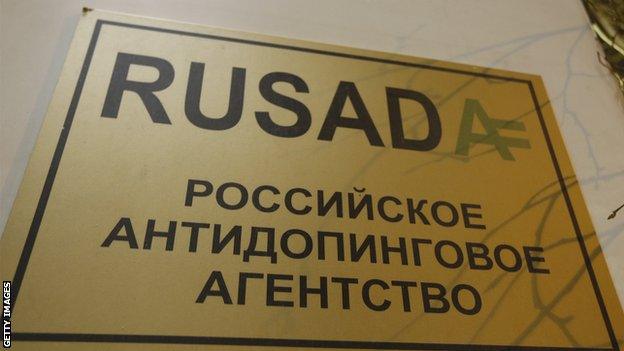Russian doping scandal: Wada suspects Russia manipulated laboratory data
- Published

Rusada's suspension was imposed in November 2015
Some Russian drug-testing laboratory data may have been manipulated before it was retrieved by the World Anti-Doping Agency (Wada), the organisation is set to reveal.
The country missed a deadline to hand over the data in the wake of a vast doping scandal that saw its team banned from last year's Winter Olympics.
In January, Wada was finally granted access to a Moscow anti-doping laboratory, raising hopes that hundreds of cheats could be punished.
However, if the data is found to have been tampered with, Russia's anti-doping agency (Rusada) could face the threat of being re-suspended.
It could also lead to renewed pressure on the International Olympic Committee to ban Russia from next year's Tokyo Olympics.
And it will ensure a suspension of Russia by the International Association of Athletics Federations (IAAF) continues.
The World Athletics Championships start in Doha on Friday.
Wada has declined to comment, but is set to hold a crucial meeting of its executive committee in Tokyo on Monday.
BBC Sport understands that senior Wada officials were briefed last month that the organisation's experts had found evidence that some data may have been manipulated before being passed over to an inspection team.
Background
A landmark Wada-commissioned report in 2016 found Russia operated a state-sponsored doping programme for four years across the vast majority of Olympic sports.
Russia was told it had to meet two criteria before Rusada could be reinstated after a three-year suspension: accept the findings of the McLaren report into state-sponsored doping, and grant access to Moscow's anti-doping laboratory.
However, Wada's stance softened, and after offering a compromise over the 'roadmap', its compliance review committee (CRC) controversially recommended reinstatement in September 2018 before the second condition had been met, prompting fury from many athletes and anti-doping organisations.
In December, Russia missed a deadline to grant access to its lab, but the following month an inspection team was finally allowed to retrieve the data.
Although it was accused by many of being too soft on Russia, Wada's leadership hailed the breakthrough, insisting it would enable it to identify potential cheats, and allow international federations to pursue cases against them. CRC chairman Jonathan Taylor - a British lawyer - also warned that if the data was found not to be authentic, he would "propose serious consequences".
It was understood Taylor was referring to a possible ban from the Olympic Games, which Wada now has the ability to issue under new sanctioning powers.
Taylor's panel will be expected to recommend that Russia is rendered non-compliant once again when he presents a report to Wada's executive committee on Monday.
However, there are fears from within the athlete community that if data has been manipulated, it may make it impossible for international federations to successfully prosecute cases against Russians suspected of doping.